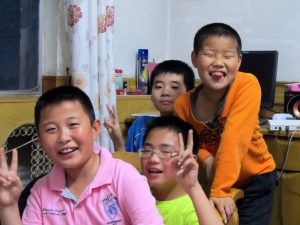I’ve started my last week of teaching. Since I only see each class once a week, this means that everyday this week I teach 3 or 4 “last classes” with different groups, saying goodbye over and over. It’s been fun so far because in every class we’re just playing games and taking photos, but it’s also sad.
After this weekend, I think time is going to start passing even quicker. Next week I’m traveling with Rosabel to her hometown of Pingxiang where I’ll be staying with her family. Then, I’m returning to Jiujiang to teach at summer camp for a week (some of you have already heard the saga of the summer camp situation, so I’ll spare you the details–I’ll just say that it was a last minute addition to my duties and leave it at that). After summer camp, I’m heading to Beijing for 3 or 4 days before I fly home.
I’ll try to keep updating…I have a feeling traveling with Rosabel is going to be especially fun–every time I talk to her, her plans for what we’ll do in Pingxiang have multiplied. And I’ll be back in my apartment in Jiujiang for a full week after that, so I know I’ll have internet access. There’s a whole backlog of stuff I’ve wanted to post about while I’ve been here…some of the entries are half-written (like the one about my students’ self-chosen English names that I began in February and never finished) and I’ve also composed lots of blog entries in my head that have never made it to the screen (like the one about how earnest Chinese high school students seem compared to Americans).
There are many things that I’ve learned and things that I’ve thought about and things that I’ve noticed while I’ve been here that I’ve wanted to post about, but I haven’t shared them because I don’t feel like I’m done learning or thinking or noticing enough to report back to you. I have all these trains of thought that have been developing the whole time I’ve been in China and I haven’t yet reached a point where I feel like I know what I want to say about them. For all the things I’ve been thinking about, I haven’t come to many conclusions.
I don’t know if that makes any sense at all to anyone but me. But I have a feeling I’m going to be talking about the stuff I realized and learned here in China long after I return to America.
I’m gonna tack on some random photos here, just because I want to.
This is a portion of the main street between my apartment and the school, at night.
My apartment building.
At the base of Mt. Lu, in a field of rape (the plant that makes canola oil…there’s no such thing as a canola plant, the name was derived from “Canadian oil, low acid” and caught on because canola oil sells better than rape oil) (before this photo was taken, my boss the headmaster asked me in very stilted English if I would join him “on a walk through the field of rape”).
My bed with the mosquito tent–and thank god for it, too. Chinese mosquitoes are immune to Deep Woods Off and they’re constantly biting me…I probably have double malaria.


























